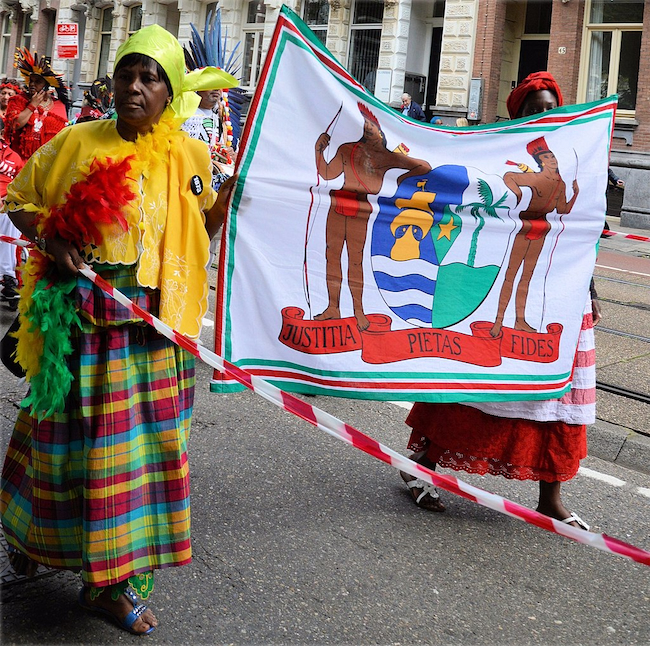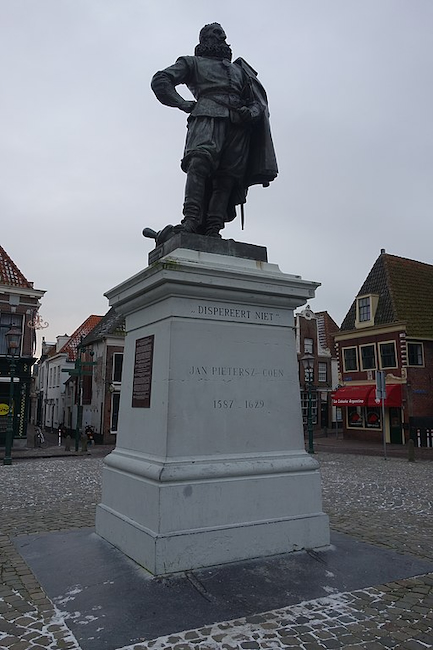There is increasing public recognition of slavery in Dutch history but silences remain
Nancy Jouwe
Baie dankie. This typical South African expression literally means ‘many thanks’ or ‘thank you very much’ and is used daily thousands of times in South Africa. What is not commonly known is that the phrase is a remnant of Dutch colonialism in the Cape and beyond. Baie comes from the Malay/Indonesian word ‘banyak’ which means ‘many’, and dankie comes from the Dutch word ‘dank’. It is an everyday example of the impact of European colonialism, including the role of the Dutch.
The Dutch East India Company (VOC) colonised the Cape for a century and a half before the English took over in 1795. The VOC brought both enslaved people and exiles from different parts of the Malay world to the Cape. The Cape is a pivot point when looking at Dutch impact on slavery history connecting Asia, Africa and Europe.
Official Dutch apologies
Recently, several Dutch dignitaries have formally apologised for the Dutch role in slavery. On 1 July 2021, the Mayor of Amsterdam, Femke Halsema kickstarted a wave of apologies during Keti Koti, the annual commemoration and celebration of the formal abolishment of slavery in the Dutch Caribbean in 1863. After her apology (the first of its kind by a Dutch dignitary), her colleagues in Rotterdam, Utrecht and The Hague soon followed suit. The mayors of the four largest Dutch cities gave these formal apologies following published commissioned research on their cities’ involvement in slavery. The research exposed the significant and prolonged roles of the Dutch as slaveowners and slave traders both in the Indian ocean and the trans-Atlantic.
On 12 December 2022, Prime Minister Mark Rutte also issued a formal apology, in Dutch and different Caribbean languages. Significantly, he did so before the release of a national research project commissioned by the Ministry of the Interior and Kingdom Relations. This research concluded that the Dutch state was involved in colonial slavery in the Atlantic and Asian world in an intentional, systematic and sustained way. The impact and afterlives of this continue to affect the Netherlands and other countries all over the world.

Ten kon drai, ‘times have changed’, were the Sranang Tongo words spoken by King William IV during an historic public apology delivered in front of the National Slavery Monument on 1 July 2023. He was the first monarch in the world to offer such an apology. But what really impressed those present (a majority of whom were descendants of enslaved people) was that he asked for forgiveness for the actions of his forebears and predecessors.
These apologies teach us a couple of things. Clearly, mainstream Dutch society is slowly but surely coming to grips with the fact that the history of slavery is part and parcel of Dutch history. This was, something denied, silenced or ignored for most of the twentieth century. It has now entered the public and political domain.
Secondly, the series of apologies were the culmination of a longer road first taken by people from the Dutch Afro-Caribbean community. Following patterns of migration from these countries to the Netherlands in the late twentieth century, these communities have gradually placed histories of slavery on the Dutch agenda. Their efforts were recognised in the speeches of both the prime minister and the king.
Fragile and partial recognition
What then, are the implications of these apologies? First, with slavery history now firmly acknowledged as part of Dutch history, backlash was perhaps inevitable. Enter Geert Wilders (who has Indonesian ancestry on his mother’s side), a political leader of extreme right-wing Party for Freedom (PVV), who scored a huge win in the November 2023 national elections. Wilders now leads the biggest political party in The Netherlands. Amongst other things, his political program calls for a retraction of Dutch apologies for slavery.

Secondly, the emphasis in these apologies and associated processes on trans-Atlantic slavery, has overshadowed slavery in the Indian Ocean region. Scholars estimate that in the seventeenth and eighteenth centuries 500,000 to a million enslaved people were taken from territories in the Indian Ocean and shipped to Dutch colonies. So it is that in Dutch memory culture, whilst the Dutch West India Company (WIC) is mostly firmly associated with slavery, the VOC is still celebrated.
In 1621, in an effort to monopolise the nutmeg trade in the Banda Islands, Jan Pieterszoon Coen, then governor-general of the VOC based in the Dutch East-Indies, committed genocide after which he proceeded to establish plantations with enslaved workers. Whilst there is greater recognition of slavery in The Netherlands today, it is also the case that a statue of Coen still stands in the town square of Hoorn, his birthplace. Hoorn is the only city in the Netherlands that has commissioned research on its slavery history without apologising for it. Despite the findings of recent research of Dutch complicity in slavery and the official apologies, examples such as this indicate the fragile and partial nature of this recognition.
Nancy Jouwe (n.l.jouwe@vu.nl) is a freelance researcher who co-edited commissioned research-projects into the history of slavery in Amsterdam, Utrecht and Delft.











